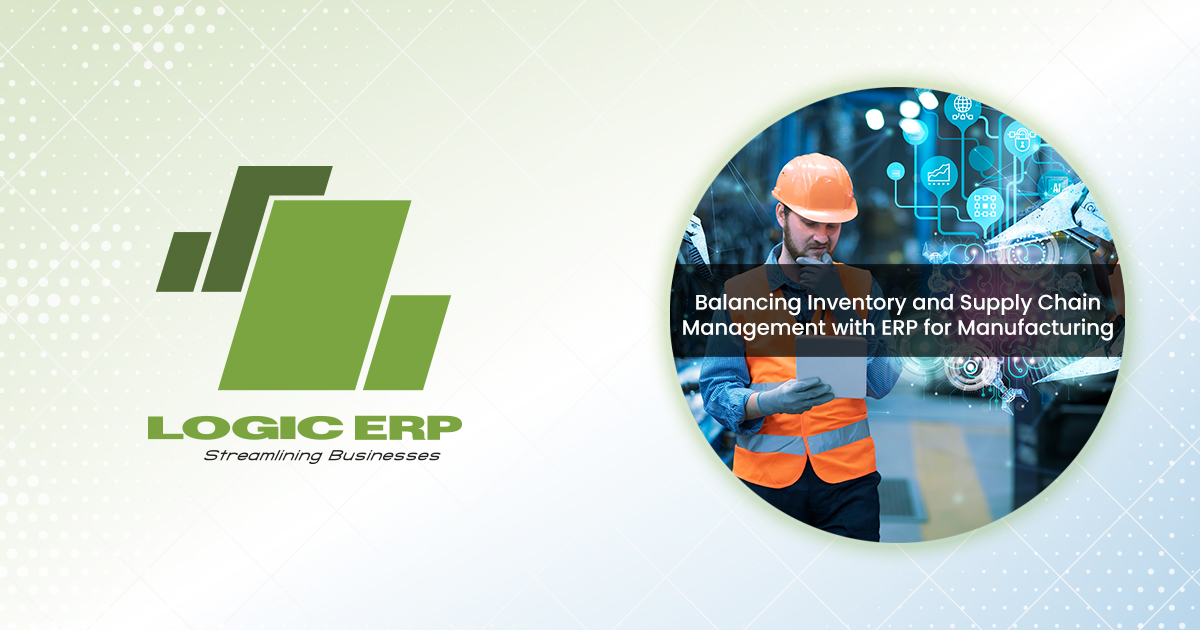

Struggling to streamline Inventory and Supply Chain Management in manufacturing? Discover how ERP systems boost efficiency and cut costs. Get LOGIC ERP to transform your operations!
In the fast-paced world of manufacturing, where efficiency and precision are paramount, the seamless integration of Inventory Management and Supply Chain Management is crucial for success. The advent of Manufacturing ERP (Enterprise Resource Planning) systems has revolutionized the industry by offering comprehensive solutions to streamline operations, enhance productivity, and ensure optimal utilization of resources. In this blog, we delve into the intricate dance between Inventory Management and Supply Chain Management in the manufacturing sector and explore how Manufacturing ERP systems play a pivotal role in maintaining this delicate equilibrium.
The Significance of Inventory Management in Manufacturing:
Effective Inventory Management is the heartbeat of any manufacturing operation. It involves overseeing the inflow and outflow of goods, minimizing holding costs, and ensuring that the right amount of raw materials, work-in-progress, and finished goods are available when needed. Manufacturers walk a tightrope between stockouts and excess inventory – both of which can have detrimental effects on the bottom line. By utilizing advanced Inventory Management techniques, companies can optimize stocking levels, reduce carrying costs, and enhance overall operational efficiency.
Manufacturing ERP and Inventory Management:
Enter Manufacturing ERP systems, which act as the conductor orchestrating the various elements of the manufacturing process. These sophisticated software solutions provide real-time visibility into inventory levels, helping manufacturers make informed decisions about procurement, production, and distribution. By automating processes and centralizing data, Manufacturing ERP systems enable companies to maintain optimal inventory levels, minimize stockouts, and prevent overstock situations. Additionally, these systems facilitate the tracking of inventory movements, ensuring accuracy and transparency throughout the supply chain.
Key features of Manufacturing ERP systems that enhance Inventory Management include:
- Demand Forecasting: By analyzing historical data and market trends, Manufacturing ERP systems can predict future demand, allowing manufacturers to adjust their inventory levels accordingly.
- Material Requirement Planning (MRP): MRP functionality in ERP systems enables manufacturers to plan and procure materials based on production schedules, ensuring that raw materials are available when needed without excessive stockpiling.
- Barcode and RFID Integration: Leveraging technologies such as barcoding and RFID, ERP systems enhance the accuracy of inventory tracking and reduce the likelihood of errors in data entry.
Balancing Act: Inventory Management and Supply Chain Management:
While Inventory Management focuses on the internal aspects of managing goods, Supply Chain Management extends beyond the walls of the manufacturing facility to encompass the entire supply chain. The effective coordination of both is essential for a smooth and efficient manufacturing process.
Supply Chain Management Software involves the planning, execution, and optimization of all activities involved in the production and delivery of goods. From procurement to production to distribution, every step in the supply chain must be synchronized to avoid bottlenecks and delays. Manufacturing ERP systems play a pivotal role in achieving this synchronization by integrating Supply Chain Management software modules.
Key features of Manufacturing ERP systems that enhance Supply Chain Management include:
- Order Fulfillment: ERP systems streamline order processing and fulfillment by automating workflows, reducing lead times, and enhancing communication between different departments.
- Supplier Collaboration: Manufacturing ERP systems facilitate collaboration with suppliers, providing real-time visibility into their capabilities, lead times, and performance. This ensures a reliable and responsive supply chain.
- Logistics Management: With features such as route optimization and transportation management, ERP systems help manufacturers optimize logistics operations, reduce costs, and improve delivery timelines.
Read More: How Manufacturing ERP Systems Optimize Inventory and Supply Chain Management?
Conclusion:
In the dynamic world of manufacturing, achieving a balance between Inventory Management and Supply Chain Management is paramount for success. LOGIC ERP provides the tools and functionalities needed to optimize inventory levels, streamline production processes, and enhance overall supply chain efficiency. As manufacturers embrace the transformative power of technology, the integration of Manufacturing ERP systems becomes not just a choice but a necessity for staying competitive in an ever-evolving industry.
Get started now! Call +91-734 114 1176 or email us at sales@logicerp.com to schedule your demo and take the first step towards operational excellence with LOGIC ERP.


